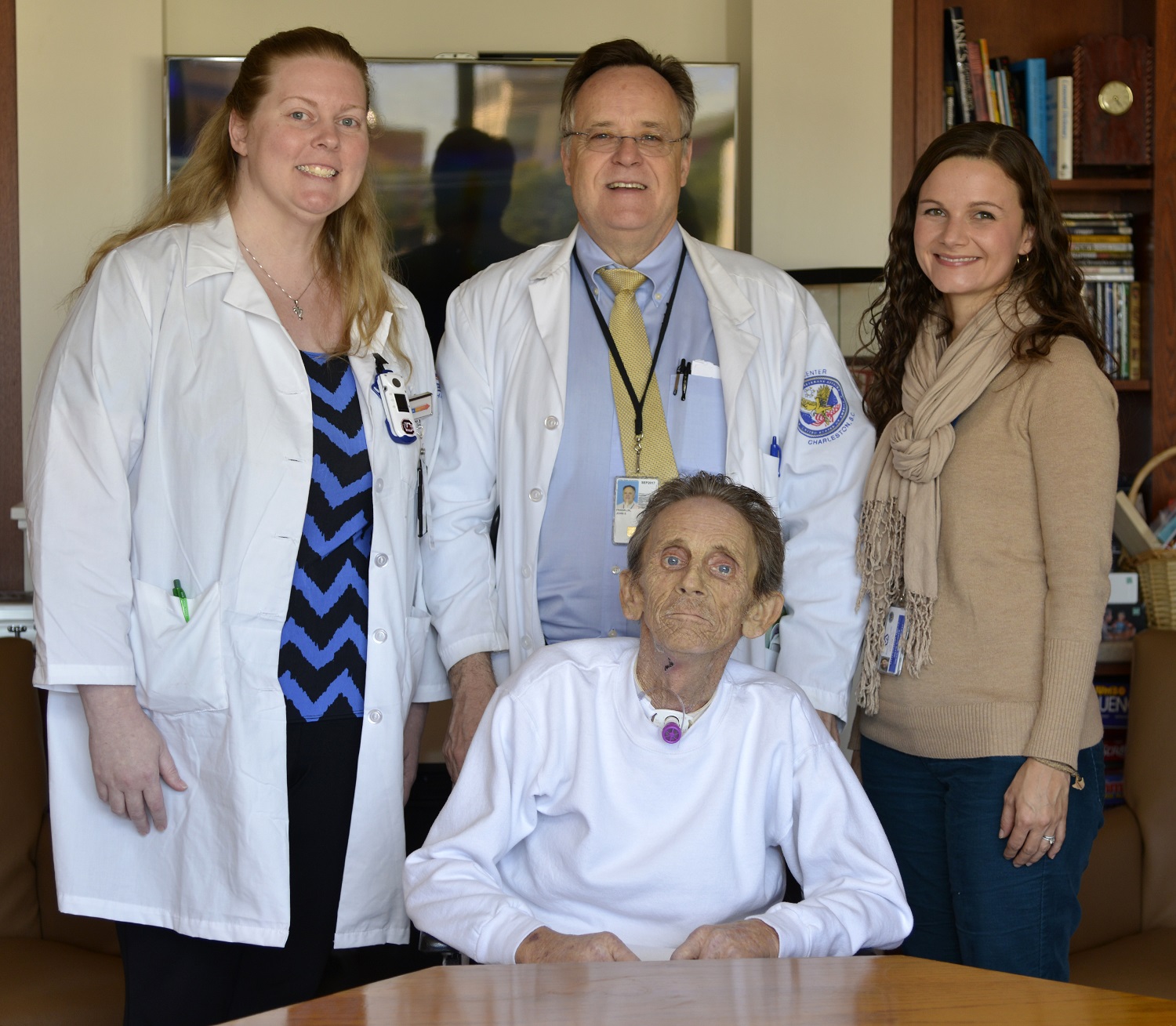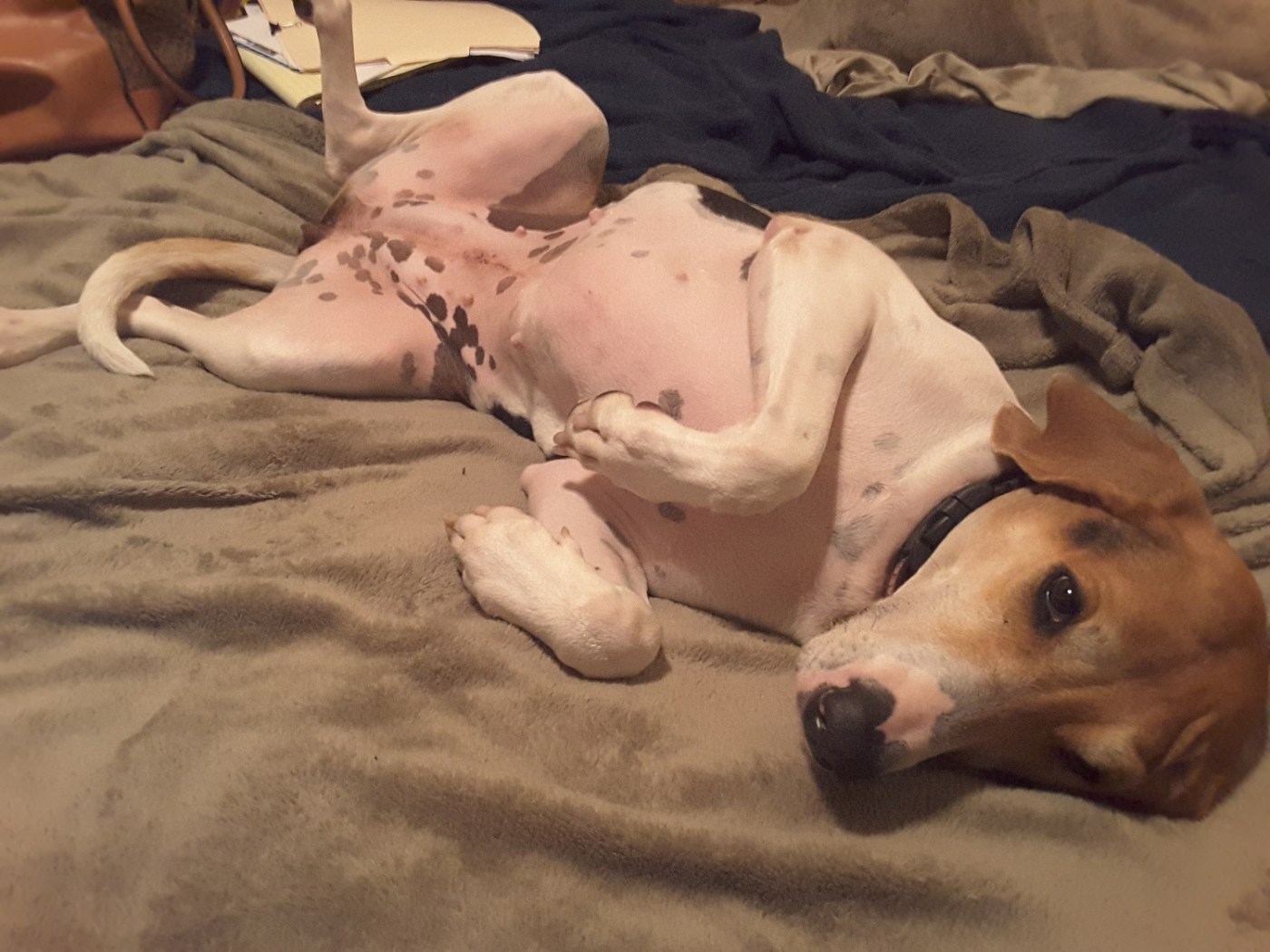Each day employees at the Ralph H. Johnson VA Medical Center in Charleston find ways to work together to put Veterans’ health and well-being first. Veterans receive patient-centered care that is team-based and Veteran-focused to manage the total health of the patient for life.
Such was the case this past summer when Army Veteran Robert Smith, 65, received the news that he had an advanced form of cancer that would ultimately end his life. Faced with a devastating diagnosis, Smith also learned that he needed immediate surgery to prevent a tumor from rupturing in his neck.
Smith’s doctors, led by the attending Ear, Nose & Throat (ENT) physician Dr. Judith Skoner, began preparing for the life-saving surgery. Though his health hung in the balance, Smith only had one concern-his dog, Precious.
Precious had been given to Smith a few years prior. At 40 pounds and full of energy, the Treeing Walker Coonhound was often a handful for the slight man, but he loved her in spite of her antics. She’d been a loyal companion since she’d come into his life.
The more Smith learned about his condition, the more anxious he became. He lived alone and had no friends or family nearby to help with Precious. What would become of his beloved dog?
Dr. Skoner and her team could tell Mr. Smith was uneasy. Without the procedure, his tumor could rupture at any moment, resulting in a traumatic and terrifying death for the Veteran. But even though Smith understood the seriousness of his condition, he seemed more concerned about the well-being of his dog.
Smith’s health was of utmost importance to the medical staff, but they quickly realized what meant the most to Mr. Smith. VA staff from across the medical center sprang into action to find a solution for the troubled Veteran.
Dr. Skoner immediately began looking for anyone who might be able to care for Precious. She started with Smith’s next door neighbor, Stacey Johnson, who agreed to take the dog temporarily. Still Smith was adamant that he needed to be the one to arrange Precious’ care. He wanted to leave the hospital.
The medical team knew it’d be crucial for Smith to remain hospitalized after the surgery. The post-surgery recovery and rehabilitation would leave him hospitalized for weeks at minimum. Nurse care manager Jennifer Crosby and VA social worker Kelli Williams had already identified that transportation and other factors would make it difficult for Smith to get back to the medical center if he left.

Veteran Robert Smith (seated) surrounded by some members of his care team: Jennifer Crosby, RN; John Franklin, MD; Kelli Williams, MSW
That’s when Voluntary Services stepped in. A volunteer driver offered to give Smith a ride to his home, wait for him to gather his things and take Precious to the neighbor’s, then bring Smith back to the hospital.
Against medical advice, Smith checked himself out of the hospital with the promise that he’d be back within a few hours. The medical team was on pin and needles as they waited for Smith to return. But at approximately 4 p.m., the van pulled back up to the medical center with Smith safely in tow.
Concerned for her patient, Dr. Skoner met them and immediately took Smith into surgery.
“You could tell he was really relieved after he got back,” recalls Crosby. “His whole demeanor changed. You could tell he felt better just knowing that Precious was taken care of.”
Whatever it Takes
VA is committed to providing Veterans with the care they’ve come to expect, and when they can, going above and beyond to meet patients’ needs. In this case, staff from across a number of service lines worked together to grant this Veteran’s wish.
Williams spent the week after Smith’s surgery calling around to area animal shelters and hound rescues to find a permanent home for Precious. As a social worker, reaching out to community members is a normal part of the job, but re-homing a beloved pet may have been a first for Williams. However, she and the rest of the staff were dedicated to doing what was best to help Smith heal and put him at ease.
“Sound communication coupled with a common goal of getting the Veteran what he needed, when he needed it, were the deciding factors critical to this patient’s care,” says Jamie Sicard, a surgical intensive care nurse involved in the case. “Staff at the Charleston VA Medical Center, including two attending physicians, the anesthesia team, SICU nursing staff, nurse case management, social work, voluntary services, and the chaplaincy, along with community agencies, all came together as a cohesive team.”
Three months after his surgery, Smith now lives at the Community Living Center at the Charleston VA. He receives hospice and palliative care as one of the benefits of his military service.
Palliative care helps patients with serious life-threatening or life-limiting illnesses. It uses comfort care with a focus on relieving suffering, being a source of support and comfort, and helping with difficult decisions. It’s about improving the patient’s quality of life in mind, body and spirit.
Dr. John Franklin, a physician in the Geriatrics and Extended Care Service and the hospice and palliative care consulting doctor on this case, explains:
“The mission of the VA palliative care and hospice team is to honor Veterans’ preferences during their end of life care. Finding a place for his dog was this Veteran’s dying wish.”
Precious Gift
Speaking through a trach, Robert Smith remembers Precious as a good and happy dog. He says he misses her cuddling next to him the most.
“I knew I was risking my own life,” he said, “but I wanted to find her a good home.”
Smith now has solace knowing that Precious has a new home. In fact, she’s been adopted by Nicole Streetman, his next door neighbor’s sister. Johnson said she picked up on her sister’s growing affection for the dog while Precious was with her and realized the solution had been right under her nose all along.
“They were actually a perfect match. My sisters run for miles every day, so now Precious can really get some of all hat energy out,” Johnson says.
“She’s a sweet dog,” says her new owner Streetman.
“And also spoiled as heck,” laughs Johnson.
About the Author: Lanelle Strawder works for the Ralph H. Johnson VA Medical Center
Topics in this story
More Stories
The Medical Foster Home program offers Veterans an alternative to nursing homes.
Watch the Under Secretary for Health and a panel of experts discuss VA Health Connect tele-emergency care.
The 2024 National Veteran Suicide Prevention Annual Report provides the foundation for VA’s suicide prevention programs and initiatives.






